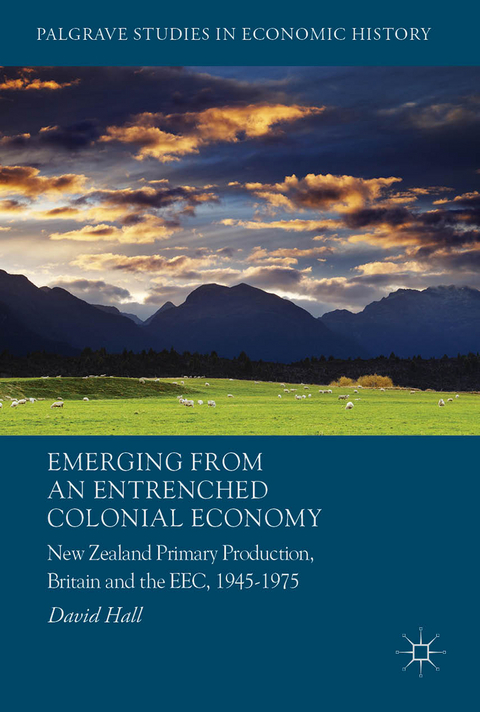
Emerging from an Entrenched Colonial Economy
Springer International Publishing (Verlag)
978-3-319-53015-4 (ISBN)
This book is a study of New Zealand shaking off its quasi-colonial dependence on Britain. Has New Zealand moved beyond its colonial heritage? Is it now time to remove the Union Jack from the national flag and change to a Republic? Hall analyses the three decades after World War II when changes in Britain, mainly as a consequence of that war, forced New Zealand to seek new markets for its exports, which were predominantly primary produce; notably meat, wool and dairy products. A key symbol of these changes was Britain becoming a member of the European Economic Community (EEC) in 1973 - how did this engagement with Europe impact on trade with a Commonwealth country? Significantly, rather than politicians and diplomats, voices of New Zealand's primary producers (the 'backbone of the economy') are used to describe the country's decolonisation in trade.
The volume traces how relationships between Britain and one of its main dominions evolved from their quasi-colonial relationship and how the dominion coped with breaking away from over-dependence on Britain not just in economic terms but also in sentimental terms. Hall provides an interesting overview of the final stages of decolonisation.
David Hall changed to study humanities in 2004 and obtained his PhD at Victoria University of Wellington, Australia, in the School of History, Philosophy, Political Science and International Relations. Previous appointments were Head of Space Plasma Physics at the Rutherford Appleton Laboratory, UK, and Director of Science at the British National Space Centre. He is interested primarily in New Zealand–British relations and has also tutored courses on North American and Modern European History.
Chapter 1: Introduction.- Chapter 2: Changing Relations.- Chapter 3: A Brutal Snapping of the Anglo-New Zealand Nexus?.- Chapter 4: Meat and the British Market.- Chapter 5: Diversification of Meat Exports.- Chapter 6: Dairy and the British Market.- Chapter 7: Diversification of Dairy Exports.- Chapter 8: Wool marketing and Reform.- Chapter 9: Handling the Threat to Wool from Synthetics.- Chapter 10: Conclusion.
| Erscheinungsdatum | 16.07.2017 |
|---|---|
| Reihe/Serie | Palgrave Studies in Economic History |
| Zusatzinfo | XVII, 339 p. 30 illus., 3 illus. in color. |
| Verlagsort | Cham |
| Sprache | englisch |
| Maße | 148 x 210 mm |
| Themenwelt | Geschichte ► Teilgebiete der Geschichte ► Wirtschaftsgeschichte |
| Wirtschaft ► Allgemeines / Lexika | |
| Schlagworte | Agribusiness and primary industries • Agricultural Economics • agricultural science • dairy industry • Diversification • Domestic organisation • Economic History • Economics • Economics and finance • Economic systems and structures • Economy-wide Country Studies • Environmental economics • Macroeconomics • Marketing • meat industry • Natural Resource and Energy Economics • Political Economy • Wool industry • World War II • ww2 |
| ISBN-10 | 3-319-53015-1 / 3319530151 |
| ISBN-13 | 978-3-319-53015-4 / 9783319530154 |
| Zustand | Neuware |
| Informationen gemäß Produktsicherheitsverordnung (GPSR) | |
| Haben Sie eine Frage zum Produkt? |
aus dem Bereich


